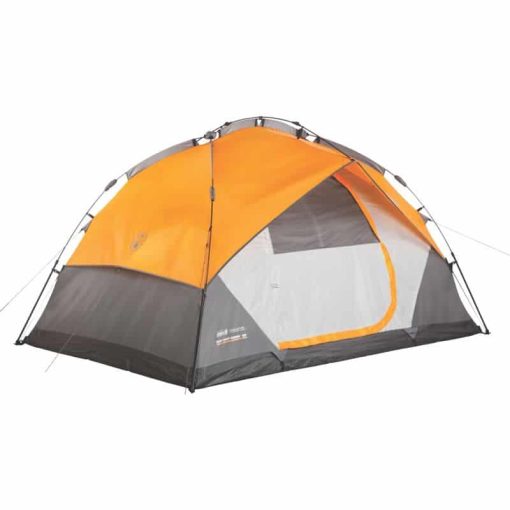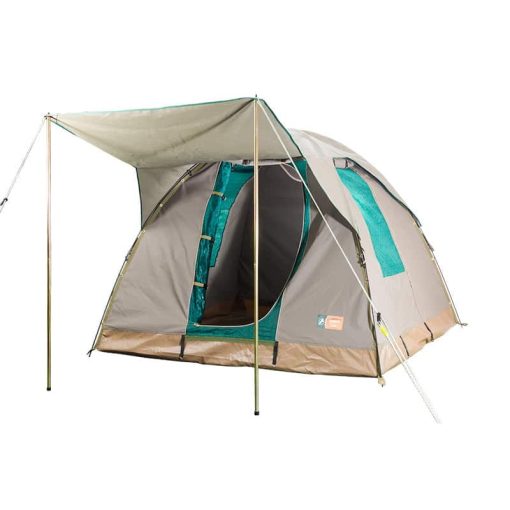Nylon Camping Tents VS Canvas Camping Tents

Outdoor camping trips are still one of the most popular leisure activities that South Africans enjoy. As camping enthusiasts, we all know how important it is to have the right equipment. A camping tent is an essential part of any camping trip, providing shelter and protection from the elements. When it comes to choosing a camping tent, two popular options are nylon and canvas. While both have their advantages and disadvantages, deciding which one is right for you can make a big difference in your camping experience.
What are Nylon Camping Tents?
Nylon camping tents are lightweight and easy to set up, making them a popular choice for backpackers and hikers. These tents are typically made of a nylon material that is both durable and water-resistant. They are available in a variety of sizes and styles, from small one-person tents to large family-sized tents.

One of the biggest advantages of nylon camping tents is their portability. They can be easily packed up and transported from one location to another, making them an excellent choice for those who like to explore different campsites. Nylon tents are also typically less expensive than canvas tents, which is a big plus for budget-conscious campers.
However, nylon tents do have their downsides. Because they are made of a lightweight material, they are not as sturdy as canvas tents and may not be as well-suited for harsh weather conditions. They may also be more prone to wear and tear over time, especially if they are not properly maintained. Purchasing additional tent stakes may add a little more security to the lightweight camping tent. The Coghlans Nylon Tent Repair Kit is an excellent repair kit to pack in case of an emergency rips and tears.
Pros of Nylon Camping Tents
- Lightweight and easy to carry
- Quick and easy to set up
- Less expensive than canvas tents
- Highly durable and resistant to tears and punctures
- Resistant to mildew and mold growth
Cons of Nylon Camping Tents
- Less breathable than canvas tents, which can lead to condensation buildup
- Can be noisy in high winds or rain
- Not as insulated as canvas tents, which can make them uncomfortable in extreme temperatures
Top Selling Nylon Tents on Camp and Climb Outdoor:
- Oztrail Bungalow 9 Camping Tent
- MSR Hubba Hubba NX Silver Tent
- Oztrail Fast Frame 6 Person Tent
- Oztrail Fast Frame Blockout 4P Tent
- MSR Elixir 3 Tent Green
What are Canvas Camping Tents?
Canvas camping tents are a popular choice for those who are looking for a more durable and long-lasting tent. These tents are typically made of a heavy-duty canvas material that is designed to withstand harsh weather conditions and provide a more comfortable camping experience.

One of the biggest advantages of canvas camping tents is their durability. They are less prone to wear and tear over time and can last for many years with proper care and maintenance. They are also better suited for harsh weather conditions, such as heavy rain and strong winds. The Campmor Nuproof 1L Canvas Sealer is a concentrated reproofing compound for canvas camping tents which can protect them and extend their lifetime.
However, there are some downsides to canvas camping tents. They are typically heavier and bulkier than nylon tents, which can make them more difficult to transport. They are also more expensive than nylon tents, which can be a concern for budget-conscious campers.
Pros of Canvas Camping Tents
- Highly breathable, which helps to reduce condensation buildup
- More insulated than nylon tents, which makes them more comfortable in extreme temperatures
- Quieter in high winds or rain
- More spacious than nylon tents, with plenty of headroom and storage space
- Highly durable and resistant to tearing and puncturing
Cons of Canvas Camping Tents
- Heavier and more difficult to carry than nylon tents
- Slower and more difficult to set up than nylon tents
- More expensive than nylon tents
- Can be prone to mold and mildew growth if not properly cared for
Top Selling Canvas Tents on Camp and Climb Outdoor:
- Tentco Senior Wanderer Bow Tent
- Tentco Senior Safari Bow Deluxe Tent
- Tentco Junior Wanderer Bow Tent
- Tentco Sahara Deluxe Tent D-Door
- Tentco Ranger Safari Bow Tent
Which One Should You Choose?
So, which type of camping tent is better: nylon or canvas? The answer depends on your camping needs and preferences.
If you’re planning a backpacking or hiking trip and need a lightweight, easy-to-carry tent, a nylon tent is likely the better choice. Nylon tents are also a great option if you’re looking for an affordable tent that is highly durable and resistant to tears and punctures. On the other hand, if you’re planning a car camping or extended camping trip and want a tent that is spacious, comfortable, and well-insulated, a canvas tent may be the better choice. While canvas tents are more expensive and heavier than nylon tents, they offer a range of benefits that make them worth the investment.
Ultimately, the best camping tent for you will depend on your individual needs and preferences. Consider factors such as your camping style, the length of your trip, and the weather conditions you’re likely to encounter when choosing between nylon camping tents and canvas camping tents.
Camping Tent Protection
No matter what type of tent you choose, it’s important to properly care for your camping tent. There are some products you can invest in for additional protection:
- Windbreakers – When camping in windy conditions, the wind can put pressure on the tent, causing it to bend and even collapse in extreme cases. A windbreak helps to block the wind from hitting your tent directly, reducing the amount of pressure on the tent.
- Waterproofing – When exposed to water, untreated fabric can absorb moisture and become heavy, causing the tent to sag and potentially collapse. Waterproofing can protect your camping tent by preventing water from penetrating the fabric, keeping you and your belongings dry during rain or other wet conditions.
- Groundsheets – A groundsheet can protect your camping tent by providing a protective layer between the tent and the ground. The ground can be rough, abrasive, and even wet, which can damage the tent’s fabric over time. A groundsheet is a layer of material, typically made of durable synthetic materials, that goes underneath your tent to protect it from damage.
- Tent Storage Bag: A storage bag helps to protect your tent while it’s not in use. It keeps it clean and dry, and prevents it from getting damaged by moisture or insects.
Conclusion
Choosing between a nylon camping tent vs a canvas camping tent depends on your personal preferences and camping needs. If you prioritize durability and insulation and don’t mind the extra weight and maintenance, a canvas tent may be the best option for you. If you prioritize lightweight, easy setup, and affordability, a nylon tent may be the better option. Regardless of which option you choose, make sure to invest in a high-quality tent that will provide you with a comfortable and enjoyable camping experience for years to come.



